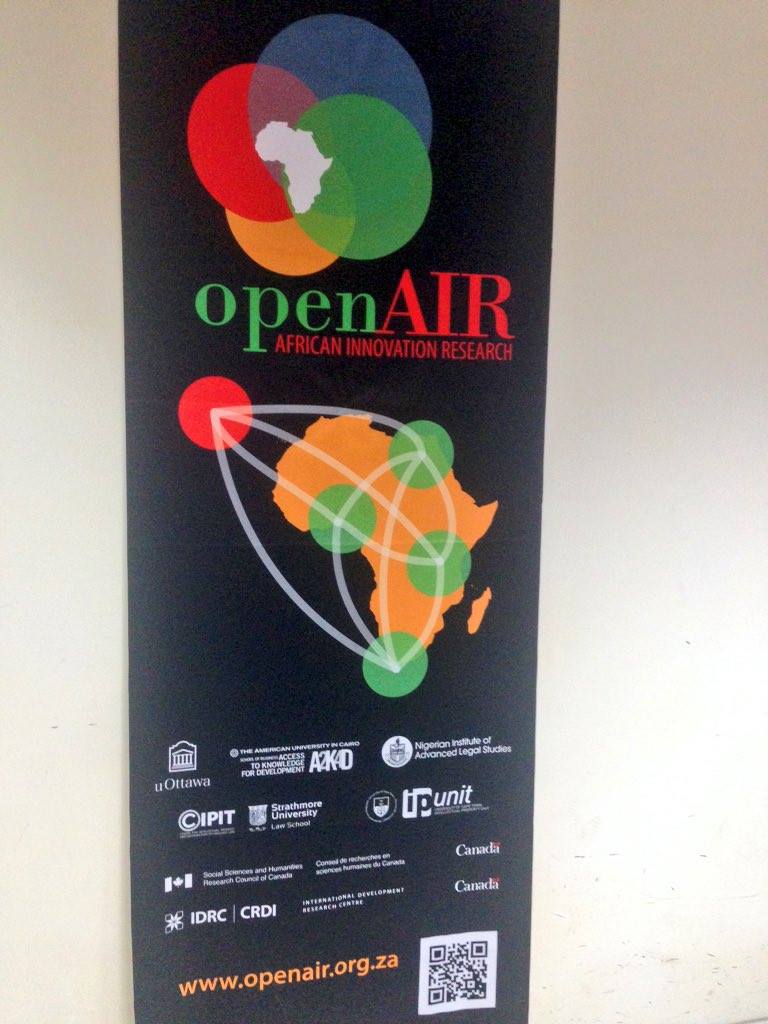CIPIT Hosts Open African Innovation Research (Open AIR) Project Case Studies Launch
- Victor Nzomo |
- April 14, 2016 |
- CIPIT Insights

Earlier this month, Strathmore University Law School’s Centre for Intellectual Property and Information Technology (CIPIT) hosted a three day workshop to launch the case studies for the third phase of the Open African Innovation Research (Open AIR) Project. The Open AIR Project is a unique collaborative network of respected veteran researchers, exploring the role of intellectual property in Africa’s open development. This multi-million dollar research project is funded by IDRC and SSHRC and is spread across 14 African countries led by Strathmore University, the University of Ottawa in Canada, the University of Cape Town in South Africa, the Nigerian Institute for Advanced Legal Studies and the American University in Cairo, Egypt.
For the next seven years, Open AIR will continue its research on knowledge governance and innovation in Africa and the launch, at Strathmore, unveiled several case studies that will examine the relationships among collaborative innovation and the sharing or appropriation of knowledge through intellectual property (IP) rights and other mechanisms. The case studies that were launched will focus on one or more of Open AIR’s four priority research themes namely, (1) high technology hubs, (2) informal sector innovation, (3) indigenous entrepreneurship; and (4) metrics, laws, and policies.
During the launch, research participants discussed each of the four themes in connection to their various proposed case studies. The first theme explored the nuances of innovation at high technology hubs, explaining how and why new businesses are likely to succeed or fail in these spaces. The second research theme was informal sector innovation, where resilience and creativity were often attributed to a shared spirit of openness and collaboration. Third theme showcased how Open AIR is interested in researching and collaborating with entrepreneurs in indigenous and local communities, which have a long history of collaborative knowledge production. Open AIR’s fourth research theme explored the cross-cutting issues of governance, metrics, and public policies for measuring, valuing, facilitating and scaling up knowledge production.
As part of the Open AIR project, CIPIT is the leader for the High Tech Hubs research theme. This is very fitting indeed. As we all know, Strathmore University has played an important role in the growth and development of the tech hubs and tech startups in Nairobi spreading throughout Kenya. We are home to one of the oldest and most active tech hubs in Kenya, iLabAfrica and its incubation arm, iBizAfrica as well as the widely known Kenya Climate Innovation Centre. CIPIT’s research as part of the Open AIR project will examine the role played by tech hubs in the innovation ecosystem. In particular, the research hypothesis is that business models grounded in networked, open and collaborative innovation (as opposed to orthodox foreign management strategies), supported by marketplace framework policies recognise local realities and reflect strategic foresight, which can help scale up knowledge-based businesses in a networked economy without jeopardising sustainability or sacrificing core values.
Through its active participation in notable projects like Open AIR, CIPIT aims to be a centre of excellence in innovative research by forging academic partnerships and links with other reputable academic institutions, professionals, industry and commerce, to be at the forefront of technological innovation and its specific application within the local context.
